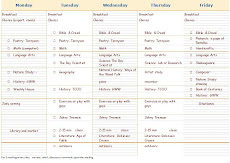I am looking at it and thinking -- no way. It is way too much. On the other hand, there's no time frame yet -- and I'm not even sure I'm going to PUT a time frame on the content. My syllabus this year may be something more like a time-period-spent checklist plus tables of contents, so I can keep the accountability of this year without a feeling of having to speed up or slow down to meet the requirements of the syllabus.
I still have determined to go slowly..... and look for connections, and time to ponder.
By the way, this seems like a good occasion to talk about something that I was very happy to hear Angela at Three Plus Two mention -- hyperfocus.
From this article:
ADD suffererers will sometimes hyperfocus on a desired subject in order to accomplish a task. This is very similar to "paying attention" as non-ADD people will do. With so many distractions, we have to narrow our field of attention to a specific task, blocking out distractions like a person might block out the cold weather by pulling a blanket closer around them....I am not sure if I am ADD -- never diagnosed anyway -- but I know I totally do this. Indeed, this description explains a LOT to me. And the coping mechanisms mentioned were extremely helpful.
My routine day is filled with hyperfocus. With a few exceptions, if I do not hyperfocus on a task, it will not get done. Those exceptions are usually _very_ routine things that I do each day without fail (brush teeth, shave, go to work, etc).
As an example, I know that flossing my teeth is a beneficial task because my dentist tells me so. So I should do it each day without fail. However, I have fallen out of that habit. Getting started back again is a major undertaking for me. Its not that I need to be reminded, its that I have to hyperfocus on the task so that I can prioritize it correctly and get the task done. A reminder note or to do list will not sufficiently help me to pay attention to this detail. ..
Once I am hyperfocusing on a task, .. that task gets all my attention. Attempts to communicate with me during that time are seen as distractions and are irritating. It is physically hard to break the hyperfocus, then concentrate on another task, and then to resume the hyperfocus. Frequently, after I read a book for hours, I am literally a zombie afterwards because I cannot easily break the hyperfocus.
My day is a regular pattern of moving from hyperfocused task to hyperfocused task.



Love it Willa- will you come to my house and make such visually appealing forms. This ones speaks to my need for clarity combined with simplicity.
ReplyDeleteWould you mind if I downloaded it and then put my own info in it (sounds pretty geeky eh?)? I just like the way it flows and it is just the format I was looking for for this year (as I have not stuck at all to my planning goals- such as being more focused and not staying up all hours of the night sort of hazily reading here and there like I did last night!)
Something I have enjoyed reading today, even though I have often cringed at the whole WTM type of thing, is this free sample from Susan Wise Bauer's new writing book. With what I have read so far, I am in agreement. I found it
at www.peacehillpress.com- it is the pdf sample talking about the three stages. It reminds me alot of Bravewriter, at least what I have read of it. Thought you might like it as you have some young ones like me.
Have a good night,
Kristie
I'd be delighted if you found a use for it, Kristie. That's why I put them up in doc -- so people can mess around with them if they want to.
ReplyDeleteThanks for the link -- I will look! And thanks for the thoughtful comments.
I finished reading the article from Susan Bauer today and found it quite good. I am not sure that I agree with her ideas on the progym- I need to take out the D'Angelo book again from the college library to look through it some more. I think it was her idea on the need for the progym to be used in highschool when the student would be able to construct a valid thesis and that before that it wouldn't be of much use. (Don't quote me on that though, I have to give it a another read).
ReplyDelete